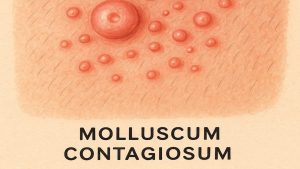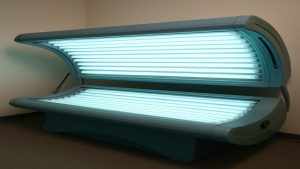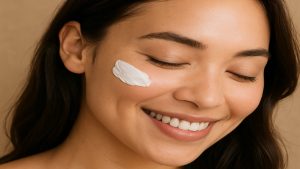- Fatty fish reduce inflammation & keep skin supple
- Avocados boost collagen & elasticity naturally
- Nuts & seeds fight ageing & UV damage
- Sweet potatoes enhance skin vibrance & protection
- Dairy, sugar & processed foods may worsen acne
Your skin reflects your internal health, and what you eat has a measurable effect on its clarity, elasticity, and tone. A balanced diet for clear skin helps reduce inflammation, supports collagen production, and protects against oxidative stress.
This article explores evidence-based foods that promote healthy skin and identifies those that may contribute to acne and dullness.
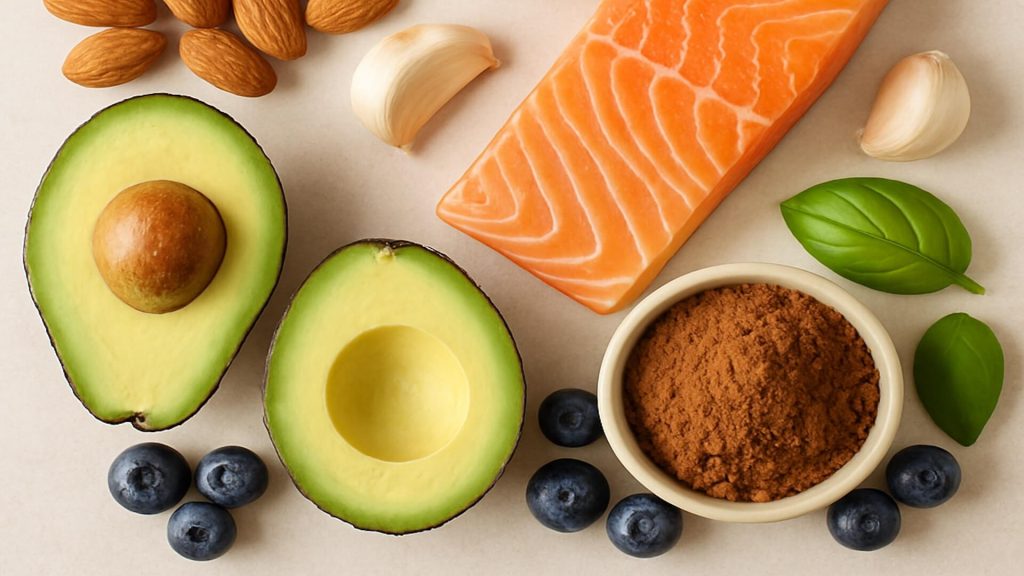
Why Diet Shapes Skin Health
Nutrition And Skin Function
A nutritious diet provides the vitamins, minerals, and fatty acids that repair and protect the skin barrier. Poor diets high in refined sugars or fats may trigger inflammation or premature ageing. A 2020 JAMA Dermatology study involving 24,452 adults linked diets rich in fatty and sugary foods to a higher incidence of adult acne [1].
Antioxidant-rich fruits and vegetables help defend against free radicals and environmental stressors. They also supply key nutrients for hydration and repair, supporting a clear complexion.
Diet And Skin Myths
For decades, diet was dismissed as irrelevant to acne, partly due to the 1969 JAMA study claiming no chocolate link [3]. Later reviews found its design flawed [2]. Modern research now supports associations between dairy, sugar, and acne, confirming that food choices directly influence skin health [1,10,17].
Best Foods For Radiant Skin
Fatty Fish
Salmon, mackerel, and sardines provide omega-3 fatty acids that keep the skin barrier strong and hydrated. These fats may help reduce redness and support smoother texture [4].
Studies suggest omega-3s can ease inflammation and support elasticity while potentially offering mild protection from UV damage [16].
Avocados
Avocados contain vitamins E and C, which help neutralise free radicals and support collagen production. A 2022 Journal of Cosmetic Dermatology study found that daily avocado intake improved skin elasticity over eight weeks [5]. Their healthy fats also aid cell renewal and repair.
Nuts And Seeds
Almonds, walnuts, chia seeds, and sunflower seeds are rich in antioxidants, vitamin E, and zinc. These nutrients support healing and may protect against oxidative damage [6]. Walnuts also contain polyphenols that help defend against environmental stress.
Sweet Potatoes
Sweet potatoes are a source of beta-carotene, a vitamin A precursor that helps protect the skin from UV-related stress [7]. This antioxidant promotes vibrancy and smoother tone, supporting the immune system and overall skin balance.
Green Tea
Green tea is high in catechins, which have anti-inflammatory and antioxidant properties. Studies show that green tea extracts may reduce acne lesions and improve skin elasticity [8]. Regular consumption helps reduce redness and irritation.
Berries
Berries such as blueberries, strawberries, and raspberries contain vitamin C and flavonoids that support collagen and fight free radicals [9]. They are among the most antioxidant-rich foods, helping maintain firmness and a healthy glow.
| Food | Benefit Summary |
|---|---|
| Fatty Fish | Omega-3s reduce inflammation, support hydration, and may protect against UV damage [4,7]. |
| Avocados | Vitamins E and C boost elasticity and aid collagen production [5]. |
| Nuts And Seeds | Provide antioxidants, zinc, and omega-3s for repair and protection [6]. |
| Sweet Potatoes | Beta-carotene promotes even tone and helps defend against UV stress [7]. |
| Green Tea | Catechins soothe inflammation and support clear skin [8]. |
| Berries | Vitamin C and flavonoids enhance radiance and reduce oxidative damage [9,11]. |
Table 1: Skin-enhancing foods and their key benefits
Worst Foods For Your Skin
Sugary Foods
Refined sugars in sweets, pastries, and soft drinks accelerate glycation, which weakens collagen and elasticity [11]. Spikes in blood sugar can increase inflammation, worsening acne and redness.
Dairy Products
A 2005 J Am Acad Dermatol study found an association between milk intake and acne in women [10]. Hormonal components in dairy may stimulate oil glands and increase breakouts. Limiting dairy intake can support clearer skin.
Processed Foods
Fast foods, fried snacks, and processed meats contain trans fats and additives that contribute to inflammation [11]. These foods offer few beneficial nutrients for the skin and may delay recovery from acne or irritation.
Alcohol
Alcohol reduces hydration and affects the body’s ability to retain moisture. Over time, excessive consumption may contribute to dullness and fine lines [11]. Keeping intake moderate helps preserve skin vitality.
Salty Snacks
Chips and salted nuts contain high levels of sodium that cause puffiness and dryness [15]. Switching to unsalted or low-sodium versions helps maintain balanced hydration.
| Food | Effect | Examples |
|---|---|---|
| Sugar | Weakens collagen and dulls skin [11]. | Cakes, sodas, pastries |
| Dairy | May increase oil production and acne [10]. | Milk, cheese, yoghurt |
| Processed Foods | Promote inflammation and uneven tone [11]. | Fast food, crisps, sausages |
| Alcohol | Dehydrates and accelerates ageing [11]. | Wine, spirits, beer |
| Salty Snacks | Cause puffiness and dryness [15]. | Chips, pretzels, salted nuts |
Table 2: Foods that may negatively affect skin health
Avoiding these foods supports healthier, more balanced skin while enhancing the benefits of nutrient-rich options.
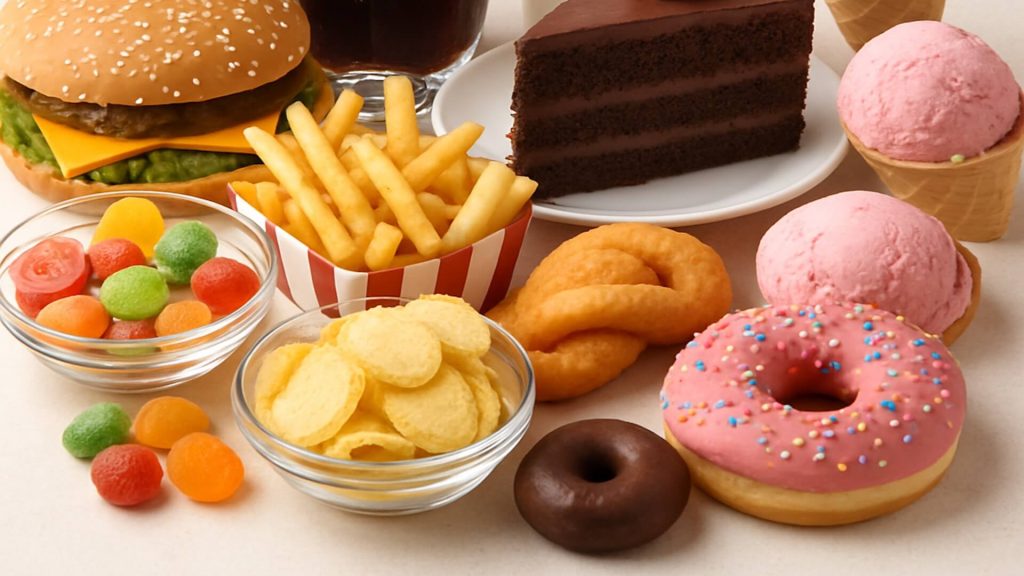
Special Diets And Skin Outcomes
Carnivore Diet
A meat-only diet may temporarily reduce inflammation due to high protein and fat intake, but it lacks essential antioxidants and vitamin C [12]. Over time, this deficiency can lead to dryness and delayed healing unless supplemented.
Ketogenic Diet
The ketogenic diet promotes stable oil production but may trigger prurigo pigmentosa, also known as keto rash [13]. Maintaining adequate micronutrients and reintroducing some carbohydrates can reduce this risk.
Dr Rajani Katta from Baylor College of Medicine highlights that whole, unprocessed foods remain the most reliable way to nourish skin [14]. The NHS and British Dietetic Association also recommend varied diets rich in fruits and vegetables for long-term skin health [14,15].
Practical Tips For Skin-Friendly Eating
- Drink about 2 litres of water daily for hydration.
- Eat oily fish twice weekly for omega-3 fatty acids [4].
- Limit processed and high-sugar foods.
- Add berries and leafy vegetables daily for antioxidants.
- Use olive oil instead of seed oils to support elasticity [18].
- Choose unsalted nuts over crisps to reduce sodium intake.
- Seek professional dietary or skincare advice if needed.
Conclusion
A balanced diet rich in fatty fish, avocados, nuts, and colourful vegetables supports clear, youthful skin by reducing inflammation and improving elasticity. Limiting processed, sugary, and dairy-heavy foods helps prevent breakouts and dryness.
Combining smart nutrition with consistent skincare forms a strong foundation for healthy, radiant skin. For further support, you can explore Monderma’s free skincare consultation.
Content is for informational purposes only. Monderma treatments are prescribed following consultation. Results and timeframes can vary. Use as directed by your prescriber.
Bibliography
- Penso L, et al. Association Between Adult Acne and Dietary Behaviors. JAMA Dermatology, 2020.
- Acne.org. Chocolate and Acne: Emerging Evidence. Updated 2024.
- Fulton JE Jr, Plewig G, Kligman AM. Effect of Chocolate on Acne Vulgaris. JAMA. 1969;210(11):2071–4.
- Calder PC. Omega-3 Fatty Acids and Inflammatory Processes. Nutrients, 2010.
- Henning SM, et al. Avocado Consumption Increased Skin Elasticity and Firmness in Women. J Cosmet Dermatol, 2022.
- Fan N, et al. Antioxidant and Anti-Inflammatory Properties of Walnut Constituents. Nutrients, 2023.
- Stahl W, Sies H. β-Carotene and Other Carotenoids in Protection from Sunlight. Am J Clin Nutr, 2012.
- Kim S, et al. The Effects of Green Tea on Acne Vulgaris. J Dermatol Treat, 2021.
- Min M, et al. The Influence of a Plant-Based Diet on Skin Health. Biomedicines, 2024.
- Adebamowo CA, et al. High School Dietary Dairy Intake and Teenage Acne. J Am Acad Dermatol, 2005.
- Cao C, et al. Diet and Skin Ageing – From the Perspective of Food Nutrition. Nutrients, 2020.
- British Dietetic Association. Skin Health. 2025.
- Xiao A, et al. Ketogenic Diet-Induced Prurigo Pigmentosa. Cureus, 2021.
- Katta R. Diet and Dermatology. J Clin Aesthet Dermatol, 2014.
- NHS. Eating a Balanced Diet. 2023.
- Pilkington SM, et al. Omega-3 Polyunsaturated Fatty Acids: Photoprotective Macronutrients. Exp Dermatol, 2011.
- Ryguła I, Pikiewicz W, Kaminiów K. Impact of Diet and Nutrition in Acne. Nutrients, 2024.
- Viola P, Viola M. Virgin Olive Oil as a Nutritional Skin Protector. Clin Dermatol, 2009.
Find your perfect skincare formula
Takes less than 2 minutes – see what your skin needs
Get Custom Formula